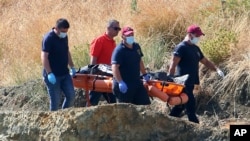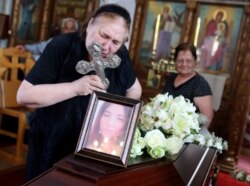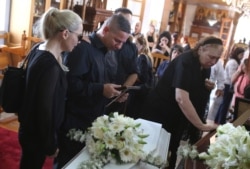A Greek Cypriot army captain who has confessed to killing five women and two girls in Cyprus, all immigrants, is expected to appear in court next week to be charged with murder, kidnapping, rape and obstruction of justice, among other charges.
The man known as Cyprus' first serial killer has highlighted the vulnerability of immigrant women to violent crimes in their adopted countries.
The chief of police has been fired and the justice minister has resigned over criticism that police did not respond more aggressively to the first hints that immigrant women were being victimized.
The bodies of six of the suspect's alleged victims have been found submerged in lakes. The body of the first victim, a woman from the Philippines who disappeared with her daughter in 2016, was found in mid-April in a lake known as the "Red Lake" near the mining village of Mitsero. Drainage from the mines has contaminated the water with a high acid content and a murky red color.
The latest discovery of a body occurred June 4 in the same lake. This body, also believed to be that of a woman from the Philippines, was found stuffed into a suitcase that was resting on the bottom of the lake.
If the victim is the woman investigators suspect, she has been missing since December 2017. Both women were domestic workers.
Other victims have been found in another body of water known as Memi Lake.
Working in Cyprus to send money home
Several of the victims were from the Philippines. At least one is believed to have been from Nepal and another from Romania. It is also common for women to come to Cyprus from Vietnam, Sri Lanka and India in hopes of finding work in the country and sending money home to their families.
The suspect, Nikos Metaxas, was arrested on April 18. He last appeared in court June 6 for another extension of his detention order.
Police said that a week after his arrest, Metaxas told them he was bored and requested a pen and paper. He then reportedly wrote out a 10-page confession to the killings of five women and two of their young daughters.
All the women were foreigners employed as domestic workers. Metaxas has not said why he chose them for victims. Police said he found his victims via online dating sites where he used the nickname "Orestes." He was found to have had online contacts with 30 women. But aside from those he named as victims, none of the other women have been reported as missing.
Hillary Margolis of London-based Human Rights Watch said immigrant women are often targeted for violence because they have fewer ties in their adopted countries and many fear losing their jobs if they report it.
"In some cases, women are sort of under the table, doing informal work. They may not have residency status," she said. "They may be in the process of applying [for residency]."
Unofficial status
She said that because of their precarious status, immigrant women are more likely to engage in work that carries a higher risk of exploitation. It's a situation in which employers have the upper hand, Margolis said. Some employers even confiscate workers' passports, keep them locked in the homes where they work, or force them to work more hours or do tougher work than they are legally allowed to.
Cypriot police are under fire for failing to pursue the women's disappearances more vigorously.
"One of the more poignant aspects of the Cyprus case is this issue of authorities really ignoring these women,” Margolis said. “It wasn't really a matter of them [the women] not being able to get access to help. Even when they disappeared, there was no attention to it. It was just treated like it was not significant because of who they are."
Margolis said, "That's something you see around the world — people of a certain background or race just not treated with the same respect by authorities and judges."
Even being female affects the victims' chances of being taken seriously.
"Women in general are not believed or treated respectfully by authorities when they try to report abuses," she said.
Given the number of women who come to Cyprus to work — 30,000 with legal status and another 30,000 without — that dynamic takes a heavy toll on societal norms.
Training in how to treat people equally is important, she said. "There needs to be clear messaging from top-level authorities that this isn't acceptable and that this case needs to be treated like any others, and people will be held accountable if they don't," Margolis said.
In response to criticism of the investigation, Justice Minister Ionas Nicolaou resigned. He said he did so because holes in the investigation concerned not only the police but also society's "attitudes and perceptions that honor none of us."
Police Chief Zacharias Chrysostomou was fired over the scandal.
Police make improvements
Police investigator Ioannis Yiorkadjis told the court Thursday that police had collected 700 statements about the case and were seeking statements from 80 more people.
Police spokesman Andreas Angelides said police also were conducting an internal investigation into their response to the case.
And the new police chief, Kypros Michaelides, announced Wednesday that he would tour police units in all districts to help boost officer morale in the wake of the scandal. He is to hold an introductory news conference Tuesday.
As for women who report sexual harassment, police said they fully investigate such complaints and move forward with prosecution if a case is established.
The government said anyone who establishes a case of sexual harassment can expect help, whether the person is a Cypriot citizen or not.
Metaxas most likely will face seven counts of premeditated murder, rape, indecent assault, kidnapping, privacy violation, attempted evidence tampering and obstruction of justice.
Margolis said conditions in Cyprus could improve as a result of this case. For instance, shelters could be established where women can feel safe asking for help, even if they aren't native Cypriots.
"Cases like this sometimes can help lead to change, as horrific as it is. It really shines a light on what's going on, and particularly with such a response from the public about this, it really does put pressure on the government to take action," Margolis said. "As horrific as this [case] is, it's not the only one."






